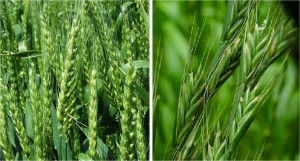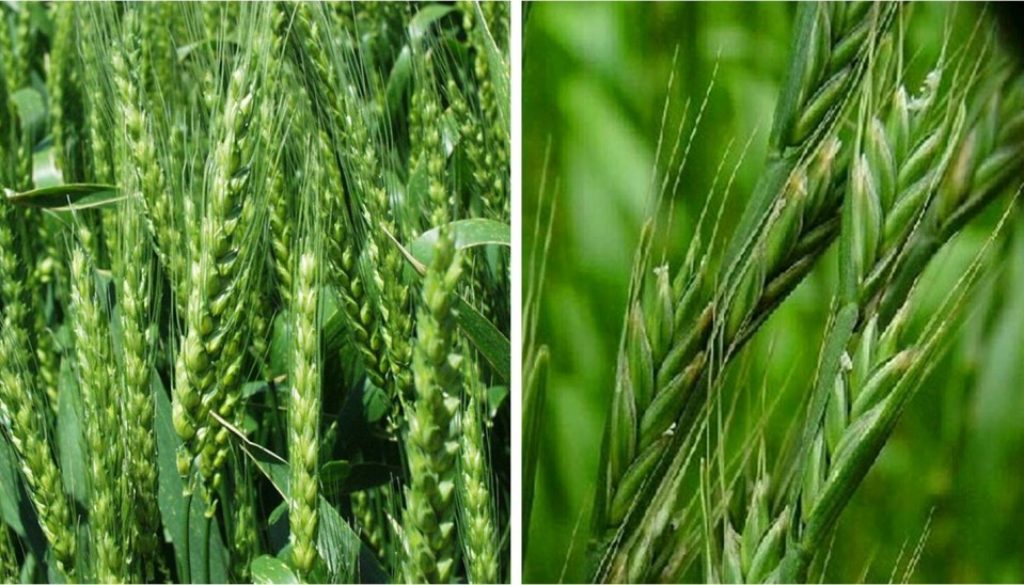Matthew 13:24-30 Jesus’ Parable of the Two Seeds

Jesus was addressing the people with parables again. Matthew doesn’t make it clear here where Jesus is and whom He is currently addressing. I think this could have been one of the parables He shared on the seashore when He spoke about the sower and the seed. Reading further into this chapter we see Jesus explain this parable to His disciples, so we know that this telling is before a crowd at this point.
We have another farmer’s story today. This farmer only had to deal with one kind of soil. It was prepared beforehand to receive the “good seed” he intended to plant there. He ran into problems, however, concerning the crop that sprang up on his land. Apparently his “good seed” wasn’t the only seed that got spread on his field that season.
After reading this story so many times, it is difficult not to just jump to the explanation. I don’t want to do that because Jesus didn’t do it right here either. So instead, we are going to go for a walk on another farm with another farmer. This farm is MUCH bigger than our previous farm. In fact, it is so big that this farmer even has laborers helping him work his farm. We are going to make our farm 10,000 acres. This is not that big by today’s standard, but back in the days of our story it was HUGE. They had to work everything by hand instead of using machines like we do today.
Our farmer and his laborers have been ploughing the field for two months now. They have trod every inch of this land three times over. Double yoked oxen pulled the latest in ploughing equipment back and forth across every section of the farm. Manure has been diligently worked into the soil and the irrigation channels have been cleared. It is time to begin the planting.
As morning dawns, the farmhands assemble at the storehouse for their supplies. Two carts are loaded with bags of seed and each man is provided with a shoulder bag to carry his seeds. The men are divided into five teams and sent out to their assigned area to start the long day’s work. Each team is made up of ten men and is initially assigned to a 100 acre section. Five men scatter and five men follow, covering the seed as they methodically make their way back and forth in their assigned section. Once the assigned section is complete, the men switch tasks and move onto the next section. It should take no more than two weeks to complete seeding all the farmland.
The seed itself that this farmer is using was years in the making. Through many years of working with the grain and holding seed out from the best producing areas of his field, the farmer has created an amazingly reliable, high yielding strain of wheat. His seed is even purchased by other farmers because of its yield capacity.
Every night at dusk, the laborers and the land owner meet back at the barn. They discuss what they have accomplished that day, what needs to be done tomorrow, and any concerns that have arisen during the day. This is also the time of day when shoulder bags have to be mended and sandals repaired.
By the time the last acre is planted, green sprouts can be seen in the areas that were planted first. The foreman, who watches over all the regular laborers, has been checking on the men throughout the sowing process. Making sure they are providing a full day’s work for their daily wage, monitoring the rate of seed usage and sending the carts back to the barn to refill in time to not disturb the flow of work, monitoring water jars to keep the workers hydrated, and ensuring that mealtime crews provide adequately for all the men. Today he is going to take a walk out to the earlier fields and check on the new growth. This is his favorite job. He likes to see all the hard work start to pay off.
He approaches the first line of green and his heart swells with satisfaction. He starts walking the rows, careful not to disturb the little plants. Something starts to bother him as he looks over the plants. He can’t quite put his finger on it but something is off. He squats down and does a closer inspection of the new growth. His mouth drops open as he stares straight at the plants right in front of him. This is NOT supposed to happen! There are weeds growing right along with the wheat the men just planted. And this isn’t just any weed; this is a weed that looks so similar to the wheat that it is hard to distinguish the difference. The foreman has had a lot of experience and notices the subtle differences, but most of the laborers wouldn’t. He straightens up and starts walking the rest of the new growth area. Yup, there are little weeds springing up throughout the whole section. He picks a couple of weeds to bring to the landowner. He has to show him what is happening. It will take weeks to repair this situation, if it can even be done at all.
The landowner is working in the barn when the foreman comes up to show him what he has found. The landowner is NOT happy with this turn of events, but he is not surprised either. He has a neighbor who he is in a blood feud against. Sometime in the night, that enemy had come along and scattered this corrupt seed in the landowner’s fields. There is no other way this kind of weed could have sprung up in his field. Who knows how much or how many fields he has tainted. Also, the plants are so young that they are very susceptible to damage.
The landowner tells the foreman to let the two kinds of plants grow together. It is too easy to confuse one for the other in their early development, but at harvest time the differences are glaring. The landowner realizes that some of his resources will be used by the weed instead of his wheat, but that can’t be helped. His seed is strong and that inherent strength will give the good seed the ability to endure the pressures created by the weeds. The landowner gives the foreman several instructions. First, educate the laborers in recognizing the two crops adult forms, so they will know how to tell the difference when the time comes. Second, when it’s time to harvest, have the laborers work their way through the fields carefully and gather all the weeds first. Next, after ALL the weeds have been removed, assemble them and BURN them. Finally, send the laborers back into the field to bring in the good crops. This process may take a little longer, but that is the only way to ensure a quality harvest. The landowner has given the foreman permission to hire any extra laborers he needed for the task. His enemy is NOT going to ruin the harvest. He will maintain his reputation for the highest quality grain, no matter what the cost.
Father God, thank You that I don’t have to try and tell the difference in the two kinds of plants. I am a horrible gardener. My plants are luck to survive my ministrations. Not being a farmer, I didn’t know how long it would take to complete the tasks assigned. I hope I didn’t stretch You laborers too thin in the story. I love hearing Your stories and trying to make them come to life. Thank You for letting me take that liberty. Thank You again for the imagination You placed within me. I don’t believe You would have given me such a vivid imagination if You didn’t intend for me to use it somehow. Thank You for providing me the “somehow” to do it too. I look forward to Your stories and to telling them in more detail. Keep me always sensitive too to Your points and don’t let me lose those points in the little details of the story.




April 29, 2016 @ 11:56 AM
I love your vivid imagination. It is definitely a God-given gift. 🙂
April 29, 2016 @ 2:56 PM
Thank you and thank Him. I am SO glad to see you back today. I missed you very much!
Someday maybe He will give me permission to write a book using my God-given imagination.